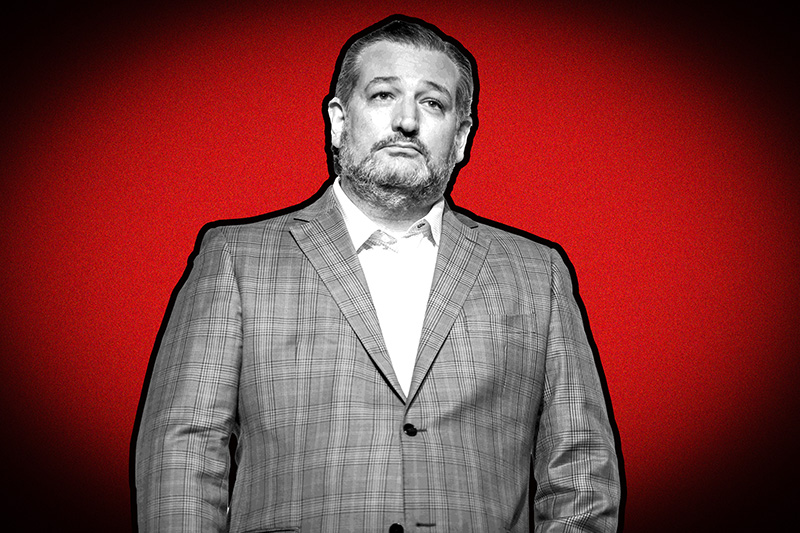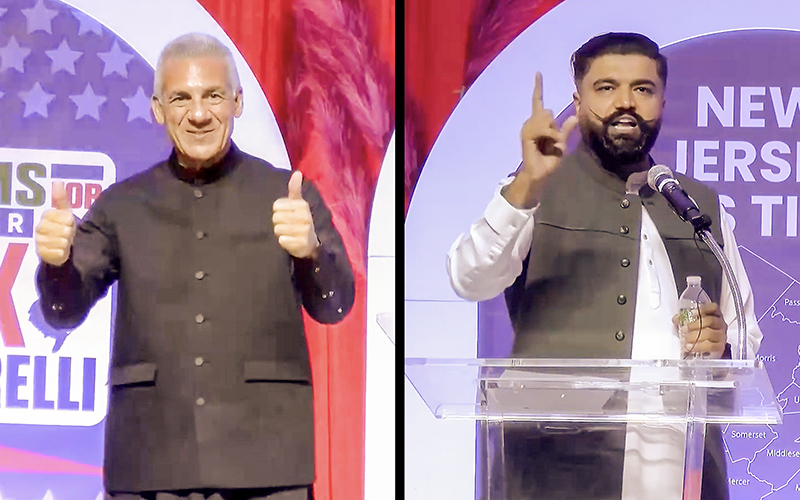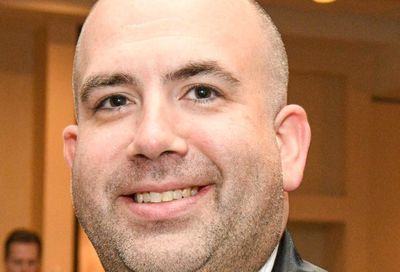GOP Candidate Floats Ted Cruz as Supreme Court Pick
Vivek Ramaswamy's short list of judicial nominees also includes Utah Sen. Mike Lee and several judges with anti-LGBTQ records.

Republican presidential candidate and Vivek Ramaswamy has said that U.S. Sen. Ted Cruz (R-Texas) would be on his short-list as a potential Supreme Court nominee should a vacancy on the nation’s highest court arise.
In a tweet, Ramaswamy announced a short-list of nine individuals he’d consider for a Supreme Court seat if elected president, including Cruz, whom the 37-year-old entrepreneur said has a record of “[fighting] for the Constitution and against left-radical court-packing” and who is a “champion of religious liberty.”
Cruz, a conservative firebrand who frequently speaks out on social issues and has his own politics podcast, clerked for former Chief Justice William Rehnquist and served as Solicitor General of Texas prior to his election to the U.S. Senate in 2012.
Cruz has previously argued on his podcast that the Supreme Court should reconsider and reverse its 2015 finding in Obergefell v. Hodges, in which the court struck down all state-level bans on same-sex marriage as unconstitutional.
Cruz argued the decision was wrongly decided and constituted a massive “overreach” by the high court, noting that marriage has traditionally been a state issue. He argued that the Constitution has remedies in place for supporters of same-sex marriage: namely, the right to debate their views in public forums, gain support from fellow citizens, and lobby state lawmakers to pass or amend marriage laws as they see fit. If voters are unhappy or disagree, they can vote against lawmakers when they stand for re-election.
“Obergefell, like Roe v. Wade, ignored two centuries of our nation’s history,” Cruz said. “Marriage was always an issue that was left to the states. We saw states before Obergefell, some states were moving to allow gay marriage, other states were moving to allow civil partnerships. There were different standards that the states were adopting.”
Cruz, who frequently mocks the cultural Left for their “woke” beliefs and consistently votes against efforts to expand LGBTQ rights, has previously called for an investigation into Bud Light over its decision to partner with transgender influencer Dylan Mulvaney, publicly shared the name of a transgender preschool teacher for getting pregnant, and sparred with Human Rights Campaign President Kelley Robinson over the definitions of men and women and the biological differences between males and females.
Interestingly, despite his efforts to appeal to conservative base voters, Cruz has argued that Texas should repeal its anti-sodomy law criminalizing consensual same-sex relations between adults. The law has essentially been nullified by the Supreme Court’s 2003 decision in Lawrence v. Texas overturning state-level sodomy bans, although many conservatives claim that case to have been wrongly decided as well.
Whatever his beliefs about the validity of the Lawrence decision, Cruz has opined that the government should not police consensual acts between consenting adults. The senator has also recently spoken out against Uganda’s recently passed law imposing harsh penalties for same-sex relations — even taking flak from ex-Trump adviser Jenna Ellis and a right-wing Florida pastor who criticized Cruz’s opposition to the law.
In addition to Cruz, Ramaswamy — in a move reminiscent of former President Donald Trump’s release of a short-list of judicial appointees — has said he would consider appointing U.S. Sen. Mike Lee (R-Utah), another LGBTQ rights opponent, and Trump-appointed Judges James Ho, of the 5th U.S. Circuit Court of Appeals; Lawrence VanDyke, of the 9th Circuit Court of Appeals; and Lisa Branch, of the 11th Circuit Court of Appeals.
Ho, another former Texas Solicitor General, is best known for an opinion arguing against the right to an abortion, which later provided the basis for the Supreme Court’s Dobbs decision overturning a federal right to abortion.
VanDyke, who became best known for crying during his confirmation hearings when questioned about his judicial temperament and his seeming animus toward LGBTQ people, has since gone about issuing rude, ideologically-tinged opinions that often attack other judges for their own opinions on hot-button social issues. One of Ramaswamy’s leading talking points on why he’d nominate VanDyke is because he “protected women’s pageants from transgender activism in Green v. Miss United States.”
Other potential Supreme Court nominees include Paul Clement, a Republican lawyer who has litigated some of the most high-profile Supreme Court cases; John Bush, a judge on the 6th Circuit Court of Appeals; Justin Walker, a judge on the D.C. Circuit Court of Appeals; and Thomas Hardiman, a judge on the 3rd Circuit Court of Appeals.
Ramaswamy also listed seven potential nominees for appellate courts, including Matthew Kacsmaryk, of the U.S. District Court for the Northern District of Texas, and Sarah Pitlyk, of the U.S. District Court for the Eastern District of Missouri.
Kacsmaryk’s stated anti-LGBTQ animus became an issue of contention when he was first nominated for the federal judgeship by Trump. Among other things, Kacsmaryk has called for a “long war” opposing the expansion of legal protections for LGBTQ people in employment, housing, and health care on the grounds that such protections might offend religious believers.
As deputy general counsel to the anti-LGBTQ Liberty Institute, he signed onto a letter calling the inclusion of protections for LGBTQ victims of intimate partner violence in the Violence Against Women Act a “grave mistake.” He criticized Utah’s nondiscrimination law for elevating anti-LGBTQ discrimination to the same level as other types of discrimination — even though the conservative Church of Jesus Christ of Latter-day Saints backed the legislation, which contains many religious exemption carve-outs.
In 2016, Kacsmaryk signed onto a letter commenting on a proposed regulation regarding nondiscrimination in health care, in which he and his fellow signatories called being transgender “a delusion.” And he has voiced support for allowing employers to use their own religious beliefs as justification for refusing to provide insurance for birth control or other medications — a principle that has grave implications for the LGBTQ community.
Pitlyk, too, expressed views similar to those voiced by Kacsmaryk when, while working for the anti-abortion Thomas More Society, she penned an amicus brief attacking the Affordable Care Act’s contraceptive mandate on the grounds that employers should be allowed to refuse to provide insurance coverage for procedures or treatments to which they personally object.
As CNN has reported, Ramaswamy, a biotech entrepreneur who is largely self-funding his campaign, has spent much of his time on the campaign trail touting headline-seeking proposals, such as raising the voting age to 25, ending birthright citizenship, and eliminating race-based preferences “in every sphere of our lives.” He has frequently attacked the transgender community, LGBTQ visibility, and has criticized companies that use their public platforms to advocate for “woke” social causes that may offend conservative customers.
Earlier this year, Ramaswamy criticized Bud Light over its partnership with Dylan Mulvaney for a social media promotion — which has since garnered significant backlash — saying it was the “latest example of a trend in corporate America where companies pretend to care about something other than profit and power precisely to gain more of each.”
“Their executives are even engaging in self-harm to the company’s own commercial goals, alienating their customer base by this Dylan Mulvaney deal that they struck, when in fact, it just makes them feel better about themselves and bend the knee to this new ESG [environmental, social, governance] orthodoxy,” he told Fox News at the time.
He cited Netflix’s decision to backtrack on projects that would attract a more liberal audience following a “disastrous quarterly earnings report” as an positive example of “capitalism working itself out” and providing an example for other corporations on how to self-correct after alienating some consumers.
“I think that there’s an opportunity for companies to set their course straight” he said. “I believe in companies learning from their mistakes.”
Support Metro Weekly’s Journalism
These are challenging times for news organizations. And yet it’s crucial we stay active and provide vital resources and information to both our local readers and the world. So won’t you please take a moment and consider supporting Metro Weekly with a membership? For as little as $5 a month, you can help ensure Metro Weekly magazine and MetroWeekly.com remain free, viable resources as we provide the best, most diverse, culturally-resonant LGBTQ coverage in both the D.C. region and around the world. Memberships come with exclusive perks and discounts, your own personal digital delivery of each week’s magazine (and an archive), access to our Member's Lounge when it launches this fall, and exclusive members-only items like Metro Weekly Membership Mugs and Tote Bags! Check out all our membership levels here and please join us today!




























You must be logged in to post a comment.